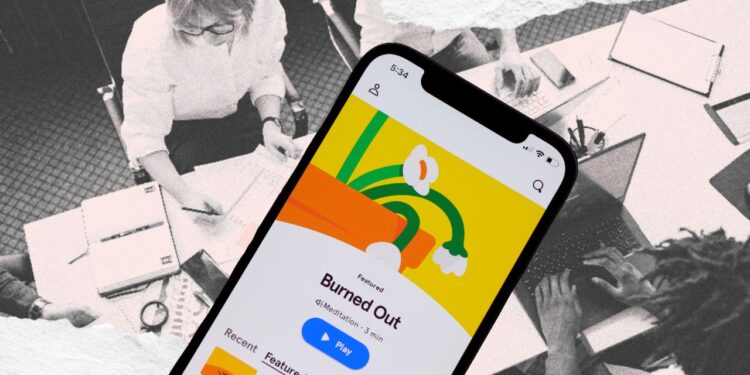- When they leave their current role, 81% of employees want a job in an organization that supports mental health.
- One way employers can support mental health is by providing access to meditation apps like Headspace for Work.
- However, meditation apps are just one of many resources; access to medical coverage and professional support is crucial.
Employers must prioritize employee wellbeing if they are to attract and retain talent.
According to APA’s 2022 Work and Wellbeing Survey, 81% of individuals will be on the lookout for workplaces that support mental health when they apply for jobs in the future.
Not supporting mental health in the workplace comes at a huge financial cost. Deloitte’s 2022 Mental Health and Employers report highlighted that the total annual costs of absenteeism, presenteeism and labour turnover have increased by 25% since 2019, reaching an estimated annual total of £53-56 billion in 2020-21.
The increase in total costs was, overall, down to higher employee turnover, with more people leaving or planning to leave their job for mental health or wellbeing reasons.
Fortunately, improvements in the way employers prioritize mental health in the workplace could well be on the horizon. APA’s survey also found that 71% of employees think their employer is more concerned about the mental health of employees now than in the past.
The onus is now on employers to turn concern into action.
One way employers are supporting wellbeing is through access to meditation or mindfulness apps. Headspace, one of the world’s most well-known meditation apps, has designed a product specifically for employers and their teams in mind.
Headspace for Work provides teams with access to a range of resources designed to help manage stress and improve focus. Here’s how it works:
Of course, Headspace is just one example and there are many more besides. Buddhify is another. Buddhify’s niche is mobile or on-the-go meditation, and provides meditation exercises that time-poor users can participate in whenever, wherever.
There are guided meditations for “Walking,” “Stress & Difficult Emotion,” “Work Break,” “Going to Sleep,” “Waking Up” and for a range of other contexts and scenarios.
With so many mediation apps out there, it can be difficult to find the best or most appropriate one for an organization’s or individual’s needs. One Mind PsyberGuide is a non-profit project that gets experts to review apps and resources based on four pillars: Credibility, User Experience, and Transparency of Privacy Practices.
There’s a section designed to help employers to find and compare apps for their workplace.
Not “an equal substitute” for medication or therapy
Although meditation apps may help employees manage feelings of stress both in and out of the workplace, they are just one of many tools employers can leverage.
In a Harvard Business Review article to help HR managers decide whether to provide mental health apps to employees, John Torous and Elena Rodriguez-Villa say the “best thing” employers can do is to provide “robust health care coverage at a reasonable price.”
“This coverage should include comprehensive mental health care that makes face-to-face therapy with a licensed clinician affordable and accessible,” they explained in the article. “A mental health app on its own is not an equal substitute. That’s because to date, there isn’t evidence that self-help apps are as effective as therapy or medication in treating mental illness. But they may be able to help some people better cope with stress and symptoms related to anxiety or depression.”
In February, to coincide with Time to Talk Day, the restaurant chain Nando’s launched a mental health support service for its 18,000 U.K. employees. In partnership with the program provider Maximus, Nandos is offering its workforce cost-free Access to Work Mental Health Support Service.
Funded by the Department for Work and Pensions (DWP), the program provides nine months of confidential one-to-one support for those struggling with their mental health, including coping skills and workplace adjustments so they can return to, or remain in, work.
Harvard Business School graduate Kayla Lebovits is the CEO and founder of digital employee benefits platform, Bundle.
“While meditation apps are great to lead people to practice and give them reminders, they lack the human element that we feel our people need to be well and thrive,” Lebovits told Allwork.Space. “Our company does not provide access to meditation apps at work, as we offer our employees access to over 100 live, interactive, expert-led 1:1 wellbeing session with trained facilitators, wellbeing coaches, and on-demand meditation journeys to help them manage their stress, anxiety, and overall wellbeing.”



 Dr. Gleb Tsipursky – The Office Whisperer
Dr. Gleb Tsipursky – The Office Whisperer Nirit Cohen – WorkFutures
Nirit Cohen – WorkFutures Angela Howard – Culture Expert
Angela Howard – Culture Expert Drew Jones – Design & Innovation
Drew Jones – Design & Innovation Jonathan Price – CRE & Flex Expert
Jonathan Price – CRE & Flex Expert













